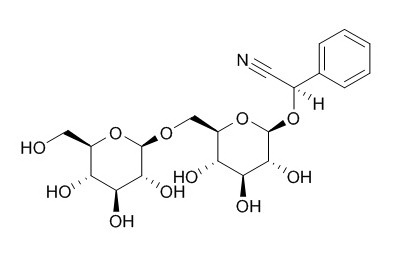Natural Products
Amygdalin
| Catalog No. | CFN98373 |  |
| CAS No. | 29883-15-6 | |
| Molecular Weight: | 457.4 | |
| Molecular Formula | C20H27NO11 | |
| DBs | [PubChem]:274952047 [ChEMBL]:27613 [PCIDB]:1437 |
Standard InChI:
InChI=1S/C20H27NO11/c21-6-10(9-4-2-1-3-5-9)30-20-18(28)16(26)14(24)12(32-20)8-29-19-17(27)15(25)13(23)11(7-22)31-19/h1-5,10-20,22-28H,7-8H2/t10-,11?,12?,13+,14+,15-,16-,17?,18?,19+,20+/m0/s1
Biological Activity
Amygdalin induces apoptotic cell death in human DU145 and LNCaP prostate cancer cells by caspase-3 activation through down-regulation of Bcl-2 and up-regulation of Bax,suggests it may offer a valuable option for the treatment of prostate cancers.[1]
Amygdalin suppresses the prostaglandin E(2) synthesis and the nitric oxide production by inhibiting the LPS-stimulated mRNA expressions of COX-2 and iNOS in the mouse BV2 cells.[2]
Amygdalin can inhibit genes related to cell cycle in SNU-C4 human colon cancer cells.[3]
Product
References
[1] Chang H K, Shin M S, Yang H Y, et al. Biol Pharm Bull, 2006, 29(8):1597-602.
[2] Yang H Y, Chang H K, Lee J W, et al. Neurol Res, 2013, 29 suppl 1(1):59-64(6).
[3] Park H J, Yoon S H, Han L S, et al. World J Gastroentero, 2005, 11(33):5156-61.
[4] Zhou C, Chen K, Sun C, et al. Biomed Chromatogr, 2007, 21(7):755-61.
Product Use Citation





